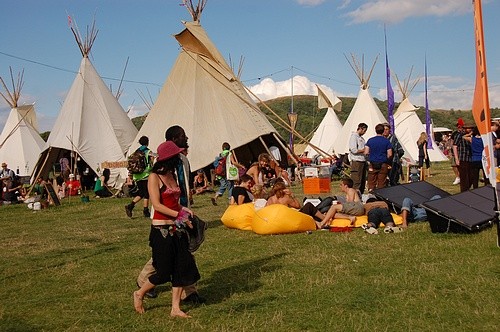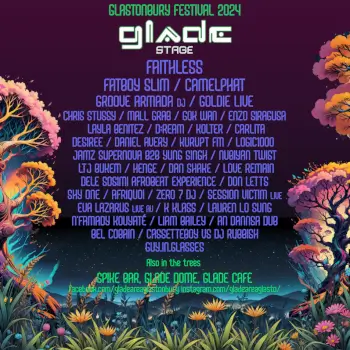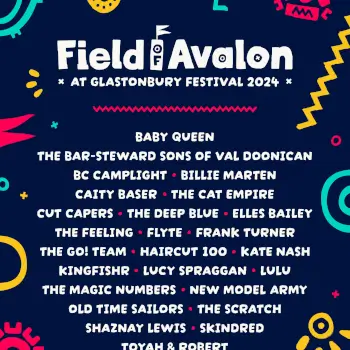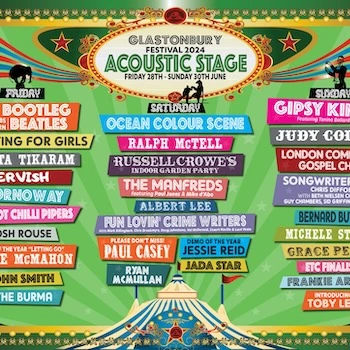
The Big Green Gathering - CANCELLED 2009
Wednesday 29th July to Sunday 2nd August 2009Mendip Hills, near Cheddar, Somerset, England MAP
adults £125, children under 12 free and 12-17 £50
Last updated: Wed 2nd Sep 2009
Stuart Galbraith first got into the business after going to Leeds University and becoming the social secretary there in 1981. He then joined MCP in 1984 and was there through until 1999 when it was sold. MCP was bought by an American company who in turn got bought out by Clear Channel. Live Nation and Galbraith then split away from Clear Channel as a dedicated promotions organisation. Last year Stuart Galbraith was sacked from Live Nation and soon after launched his new venture Kilimanjaro Live Limited.
Kilimanjaro is a joint venture with AEG, the world's second largest promoter, which will act independently. Galbraith announced when the company was first launched that it was a boutique promoter, that can be nimble and flexible. I asked him what 'boutique' means because in the hotel trade it means exclusive luxury. "I would refer to Bloodstock as being boutique it's specific to a very narrow market. So indeed is Wakestock, that's extreme sports and music, and Big Green Gathering equally I think you could argue is targeting a distinct audience, although we and they want to appeal to a wider audience. So they are boutique, tailored, or should it be bespoke, yes bespoke to the customer."
Galbraith is a man aware of the main challenges that are now facing the live industry. "Without mentioning scary words like recession and depression, the whole world is looking at finance and people are being a lot more circumspect about how they spend their money, and leisure will be one of the areas where potentially it will feel a significant tightening."
Kilimanjaro has three main areas of business - festivals, large-scale tours and new talent. I wanted to know where the main territories for the business lie and if Galbraith considered the company a global one. Galbraith responded, "We're a joint venture with AEG that enables us to work anywhere in the world. Predominantly our new talent and touring business will be in the UK, but festivals we're looking at with an international basis."
I asked Glabraith which festivals he was already involved in, he responded, "Currently the only ones that we're publicly involved in and have announced, is we've bought a 51% share in Wakestock, a similar arrangement in Bloodstock, a financial position in Big Green Gathering and this year we did some consultancy work for WOMAD."
I wanted to know how his acquisition of these events would make them better for the people who go to them. Galbraith replied, "It'll sustain the festivals, so they will survive the festival market is very much tighter than it has been, there's a great deal of competition. Bloodstock, Wakestock, and Big Green Gathering needed some financial injection to keep them in existence, we can bring some efficiency to the festivals which they haven't had previously, but without becoming involved in the artistic or the customer presentation side."
Galbraith was clear that the feel and look of the festivals he bought was very important to him. "I do feel that the lifeblood of the festival is the character of it and the identity that these festivals have built over the last eight to fourteen years."
However, that didn't mean that the company wouldn't get involved at all, Galbraith reveals, "I think there will be some changes that need to be made. Wakestock and Bloodstock had to have some changes made. There were some aspects of customer delivery that weren't up to scratch to be quite honest, and they needed improving. So we did so in conjunction with partners and the founding partners in the festivals."
The chief executive wanted to make clear that the investment by Galbraith's company wouldn't change the experience of festival goers at his festivals in a negative way. He also wanted to pointed out that Kilimanjaro wasn't a big business, "Kilimanjaro, in the UK, is probably one of the smallest commercial providers, although we have backing from AEG, our ventures are our own. The reason I've gone into Bloodstock, Wakestock, and Big Green Gathering is because I think smaller festivals can be successful if they have a uniqueness or character of their own."
He continued, "When I say there are aspects that need sorting out, whether it be better accountancy, whether it be better financial controls these things will secure the future of these festivals. But also things such as better security, better car parking, better traffic management, are things that customers all welcome."
I said that I was worried that financial control would also mean an influx of sponsorship, and a change in bar and food facilities. However, Galbraith replied, "You don't have to change what happens on stage, the stall holders, the cafes, the volunteer labour force etc. What you do have to change though is things that are not good about the festival."
"To give you a few examples, if you look at Wakestock last year, the council were very concerned about the deployment and provision of security, the wet weather provision, which indeed led to the point where the festival had to be cancelled on the Saturday afternoon, and they lost the Saturday night last year. The impact on the local community with regards to traffic was absolutely horrendous."
The chief executive continued, "We ran that festival this year with Mark the founding partner, we survived some horrendous weather, security was as near perfect as you can get, although it will never be perfect, and the traffic management was a thousand percent better than it was in previous years. To the point where at the council de-brief there was no complaints and they agreed to an increase in capacity for future years. If you compare that position to where the festival was 12 months ago the council was questioning whether the festival could go ahead in future years."
I wanted to know if his investment in Big Green Gathering, would lead to all his festivals becoming greener, and would he take anything from the green festival to apply to other parts of the business. "That's one of my primary objectives, I don't profess to be at the cutting edge of green technology, or green initiatives, although I'm very keen to progress our festivals. Part of my involvement with Big Green Gathering is to get a two-way flow of information, so that I can learn stuff and indeed already am. Having been down to the site and met Andy the local farmer, and seen the wetland system that he's installed this year. I'd love to do that at other sites where we're going to run permanent festivals."
A wetland system is a natural sewage system that means instead of having to pay for human waste to be sent around the country to sewage works, it's actually dealt with on site.
I asked him if he was planning to get involved with any more festivals. He replied, "I think that's it for now. There's one new festival, which we're looking to launch next year, which at the moment I can't tell you a lot about. It's very much in the rock vein, to enter the market place in the same area as Download."
I wondered if this meant another Bloodstock type event. Galbraith was keen to define the difference, "No Bloodstock is pure metal and pure rock, without going into the nuances of rock, the new festival that we'll launch will be broader rock than that."
The council have been approached for a new festival in Guildford by AEG, I wondered if that was anything to do with Kilimanjaro. Galbraith replied, "I'm aware of it, I'm not directly involved, although I should correct you, in so much as the council weren't approached, the council approached AEG to ask them to put in a suggestion for an event. More than that I really don't know, it's something that's not really in my work area."
So what of festivals in other parts of the world, were any of those international festivals he had mentioned already added to the portfolio? Galbraith was keeping his cards close to his chest, "It's anticipated that we'll have at least two or three festivals in other territories, which we'll partner with local partners."
I hoped perhaps he'd be more forthcoming with the line-ups for his festivals next year. But he was keeping even quieter on that front, countering "No not yet, it's too early, silly season has only just started."
Kilimanjaro already have a lot of bands on their touring rosta with big names like Sharleen Spitari, Simply Red, Metallica, Elliot Minor, Slipknot, Grace Jones, Tracy Chapman, and Deep Purple. The company also have a whole myriad of smaller developmental shows with more than seventy shows on sale in venues under 1000 capacity.
For their Metallica charity gig at the O2 Arena last month, fans that purchased online and skipped the paper, simply swiping their plastic while presenting a photo ID at the door. I asked him if Metallica's ticketless system would become the common way of buying tickets. "I think it will vary from tour to tour. It was very specific to the band's wishes. The tickets were for the launch party priced at only £5, it was for charity and they were very keen they didn't fall into secondary ticketing hands. As to whether we'd apply that for the whole tour, I think it's unlikely."
The system did indeed halt the secondary ticket market however, and the chief executive added, "It is an absolutely perfect way of preventing secondary ticketing and was almost 100% successful on the Metallica show. With it being two shows, we had a Berlin equivalent as well, in the whole of the European market place the band did not want people to profiteer. When we tour the band there will be a lot more tickets in the marketplace, so the demand and the scope for people being ripped off will be a lot less."
"The system took a lot of time of both investment people and a lot of money on the part of Ticketmaster and I'm very grateful that they were prepared to do so. In terms of its actual administration on the day it was absolutely fine. It ran very, very smoothly indeed."
The system is now in place that means future charity events, and other events where high profiteering might be likely could use it. Galbraith explained, "If you asked Ticketmaster if it cost them money, I'm sure the answer would be yes, but I think it was an investment they were prepared to make for the future and they've now have the technology and they've dry run it, so they are ready to go."
Kilimanjaro are in the enviable position as a promoter to be able to cherry pick bands and have bands approach them to help with their tours. Their boss explained, "It's about relationships. I've been in the business 25 years, we chase and we are chased, and we work on the relationships that we've built up over all those years. The company now has four great new bookers who are keen and hungry and are out every night hunting for new bands. Our bands are out in London every night now. We work on a national basis, and of the people we've brought in one is from Oxford and one is from Stoke so they know the regional markets there well too."
I ask him how many acts does he think he'll take on in a year. "Take on is a misnomer, in as much as we're not signing them, we are just working with them on an on going process but we have no contract with them. But I'd say a 100, 150 a year."
I have to say before this interview I was highly sceptical of big businesses getting involved with smaller festivals, but with the current economic climate, and from what Mr Galbraith said about retaining the 'spirit' of a festival, I can see it's perhaps not such a bad idea.
interview by: Scott Williams
Latest Updates
 Big Green Gathering
Big Green Gatheringfestival home page
last updated: Wed 20th Apr 2022

festival details
last updated: Wed 2nd Sep 2009
 more festival alternatives offered to BGG ticket holders
more festival alternatives offered to BGG ticket holders updated as more festivals offer to help out
last updated: Fri 31st Jul 2009
 more festival alternatives offered to BGG ticket holders
more festival alternatives offered to BGG ticket holders Big Chill, Pontardawe, Stokes Bay, Endorse-It, & Sunrise Celebration
last updated: Wed 29th Jul 2009
 Mendip Council clarify Big Green Gathering\'s cancellation
Mendip Council clarify Big Green Gathering\'s cancellationafter \'untrue accusations\' appear in the media and on internet sites
last updated: Tue 28th Jul 2009





